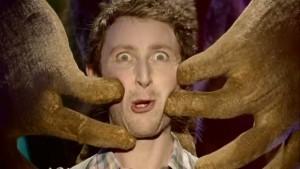Maynard says: ‘Chew chew chew chew…’
This will never not be weird.
It seems to me that whenever we now see an advertising campaign, especially when in the online or video–format, the actual linguistic content and its importance becomes belittled. That’s not to say that the linguistic content of these adverts are not necessary, but rather that the emphasis is placed more on the bizarre imagery of the advert in the pursuit of a viral success.
Bizarre, you say? Take for example the very famous 2009 Cadbury ‘Eyebrow’ advert. This advert was very popular due to its parody-inspiring children moving their eyebrows impressively in time with Freestyle’s `Don’t Stop the Rock’ whilst waiting to have their school picture taken: https://www.youtube.com/watch?v=5aDCrYUKIMo . A minute later the advert simply ends with `A glass and a half full of joy`; the Cadbury’s slogan leaving you a little confused and amazed at the same time, especially after seeing the advert for the first time. At this point, you are now more distracted with the fact that you can’t make your eyebrows move that fast and ending up looking like a James Bond impression with a face full of trapped nerves.
My point being that the viral nature of an advertisement is more important than attention to the actual product itself – clearly, dancing eyebrows don’t usually have a connection with chocolate or… fame. It does rather seem that the entire point of the advertisements is more for the conversation afterwards between you and your friends:
`Have you seen that eyebrow advert? `
All of Cadbury’s adverts since 2009 this eccentric all-purple approach following the success of the eyebrows adverts (on fleek?) from men in tiny purple cars to hairdressers smashing chocolate. The entire purpose of the advert is to baffle you with a minute or less of strangeness so that you feel like you have to talk about it to everyone you know.
Eyebrow game strong?
Another good example is 2010’s `Maynard says chew`, an advert for Maynard Wine Gums; https://www.youtube.com/watch?v=P5pBm2UBTF8. There is actual speech in this advert however, it consists of only one word; Chew. This ad follows people about their normal day-to-day business before they encounter a stuffed moose head which then proceeds to hypnotise them into chewing their wine gums as if he’s the long lost touchy-feely cousin of Futurama’s Hypotoad.
Laser owls!
Fast forward 5 years and this is still a very popular advertising method. See Ribena’s new ad, `You Can’t Get Any more Ribenary`: https://www.youtube.com/watch?v=HTOP6TOJwOI. As some of the many features of this advert is owls shooting lasers from their eyes wearing helicopter hats and I think you would agree this ad is of a similar bizarre calibre. In fact, the advert is so busy with flying blackcurrants, owls and bunny rabbits that it makes the ad easier to re-watch. The most-catchy aspect is definitely the music and after watching it 15 times, you’ll be humming the nonsensical lyrics too– zoobydoo zoobydoo…
Adverts have always had an air of oddness to them at points, but the influence of the internet and social media sharing has had to have had an effect. Perhaps with the rise of social media and the influence of the internet on commercialism, the visionary aspects of an advert have the most effect and this is just the winning format for success.
With this in mind, can it really be said to be a bad thing and does it actually matter? Often the more bizarre an advert, the more entertaining it is, the more likely it is to receive a positive response. What the ever changing nature of adverts does bring is new levels of creativity and diversity to advertising and a real-world scenario where a marketing executive can seriously suggest, `yeah, but what if the owls also shot Ribena-emitting lasers from their eyes? ` What’s not to like about that?
Image sources: www.coloribus.com, www.thedailymail.co.uk , www.tvadvertsongs.co.uk


